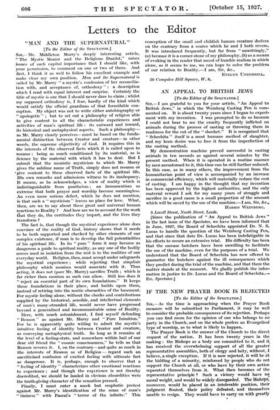Letters to the Editor
'MAN AND THE SUPERNATURAL"
[To the Editor of the SPECTATOR] SIR,—Mr. Middleton Murry's deeply interesting article, " The Mystic Monist and the Religious Dualist," raises issues of such capital importance that I should like, with your permission, to comment on one or two of them. And first, I think it as well to follow his excellent example and make clear my own position. Man and the Supernatural is called by Mr. Murry " a mystic's confession of her reconcilia- tion with, and acceptance_ of, orthodoxy " : a description which I read with equal interest and surprise. Certainly the title of mystic is one that I should never dare to claim ; whilst my supposed orthodoxy is, I fear, hardly of the kind which would satisfy the official guardians of that formidable con- ception. My object was not to write either autobiography or "apologetic " ; but to set out a philosophy of religion able to give content to all the characteristic experiences and activities of man's spiritual life : its outward and inward, its historical and metaphysical aspects. Such a philosophy— as Mr. Murry clearly perceives—must be based on the funda- mental distinction between Creator and creature—in other words, the supreme objectivity of God. It requires this in the interests of the observed facts which it is called upon to resume : being as much conditioned by its material, as is Science by the material with which it has to deal. But I submit that the monistic mysticism to which Mr. Murry gives the sublime name of Truth, simply does not resume or
• give content to these observed facts of the spiritual life. His own remarks and admissions witness to its inadequacy. It means, as he acknowledges, a view of reality which is indistinguishable from pantheism ; an immanentism so extreme that both prayer and worship become meaningless. An even more serious defect, which he does not mention, is that such a " mysticism" leaves no place for love. What, then, are we to say about these great and universal human reactions to Reality ? And how are we to account for the work that they do, the certitudes they impart, and the lives they transform ?
The fact is, that though the mystical experience alone does convince of the reality of God, history shows that it needs to be both supported and checked by other elements of our complex existence, if man is to develop the full potentialities of his spiritual life. In its " pure " form it may become as dangerous a guide to spiritual reality, as any one of the bodily senses used in isolation from the rest is to the realities of our everyday world. Religion, then, must accept under safeguards the mystical experience ; while rejecting that simpliste philosophy which monism would associate with it. Thus acting, it does not (pace Mr. Murry) sacrifice Truth ; which is far richer than monism as such can allow. Still less does it " reject an essential part of its own foundations." It keeps those foundations in their place, and builds upon them, instead of retiring into the noetie obscurities of the basement. For mystic feeling alone, without the checks and contributions supplied by the historical, sensible, and intellectual elements of man's many-stranded life, would never have progressed beyond a generalized and incommunicable sense of Reality.
Here, with much astonishment, I find myself defending " Reason " as against Mr. Murry and " Pure Intuition." For he is apparently quite willing to admit the mystic's intuitive feeling of identity between Creator and creature, as conveying metaphysical truth. So long as it remains at the level of a feeling-state, and somewhere within hail of our dear old friend the " cosmic consciousness," he tells us that Reason reveres it. I, on the contrary—and quite as much in the interests of Reason as of Religion — regard such an uncriticized confusion of exalted feeling with ultimate fact as dangerous. It is, perhaps, enough to observe that a " feeling of identity " characterizes other emotional reactions to experience ; and though the experience is not thereby discredited, we should be landed in obvious absurdities were the truth-giving character of the sensation pressed.
Finally, I must enter a meek but emphatic protest against Mr. Murry's identification of the sense of man's " tininess " with Pascal's " terror of the infinite." This conception of the small and childish human creature derives on 'the contrary from a source which he and I both revere. It was introduced frequently, but far from " unwittingly," (a) because it is a corner-stone of my philosophy, (b) as a means of evoking in the reader that mood of humble realism in which• alone, as it seems to me, we can hope to solve the problem of our relation to Reality.—I am, Sir, &c., 50 Campden Hill Square, W. 8. EVELYN UNDERHILL.


















































 Previous page
Previous page